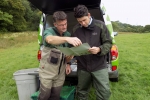North Cornwall MP Scott Mann has welcomed proposals by the Government to strengthen animal protection by introducing new welfare codes for pigs and poultry.
Welfare codes for pigs, laying hens and chickens are being updated to reflect the latest advice from vets and animal husbandry developments, as part of a programme of reforms to safeguard and enhance the welfare of animals.
Minister for Animal welfare, Lord Gardiner, said:
“We have some of the highest animal welfare standards in the world and are going further, including raising maximum sentences for animal cruelty to five years and introducing mandatory CCTV in abattoirs.
“We are carefully consulting with industry experts, and using the most recent scientific and veterinary advice to ensure this clear guidance provides the best advice to owners and keepers to help ensure the high welfare standards of their animals.”
Under the proposals, animal keepers will be expected to provide a more enriched environment for all pigs, laying hens and chickens to enable them to display more of their natural behaviours such as foraging, helping to ensure more fulfilled and healthier animals. The user-friendly codes also provide detailed guidance to animal keepers on how to assess the welfare of their animals, as well as on contingency planning to help ensure the welfare of their animals during any emergencies.
The codes will be used by enforcement bodies including Animal and Plant Health Agency inspectors and local authorities when investigating allegations of poor welfare to look at whether animal welfare standards are being met.
Scott Mann said:
“Britain has some of the highest animal welfare standards in the world, but we continue to take advice on how these can be strengthened further and I welcome the latest proposals from the Government.
“Unfortunately our membership of the EU stops us from strengthening certain aspects of animal welfare, and after we have left the EU, we will be able to consider banning or restricting the export of live animals and the sale of Foie Gras.”
A six week consultation begins today (29 January) where the Department for Environment, Food and Rural Affairs (DEFRA) is seeking views from industry and stakeholders. The consultation is available on the DEFRA website here and the new guidance is expected to be available later this year.

